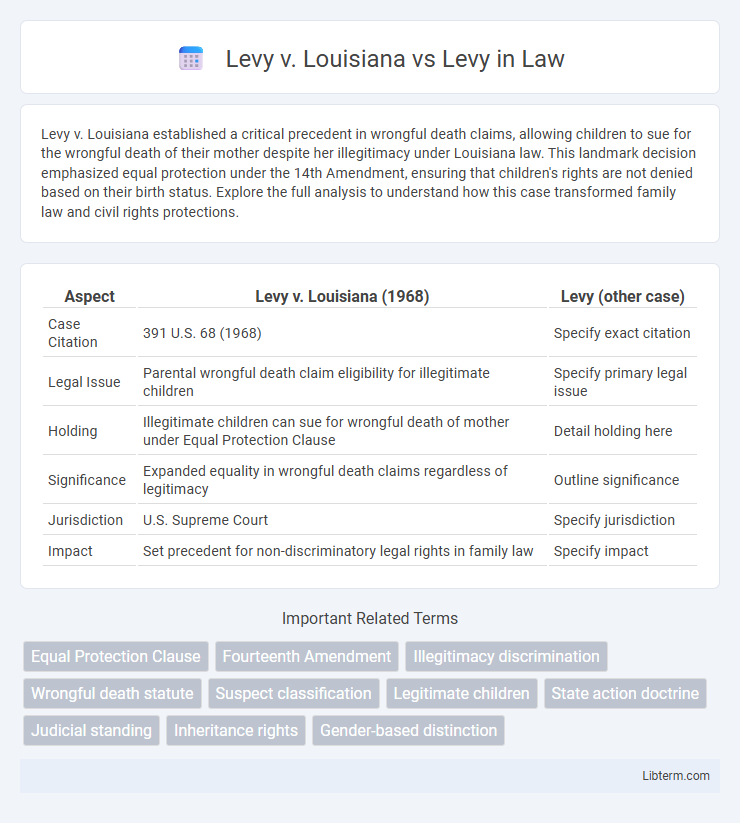Levy v. Louisiana established a critical precedent in wrongful death claims, allowing children to sue for the wrongful death of their mother despite her illegitimacy under Louisiana law. This landmark decision emphasized equal protection under the 14th Amendment, ensuring that children's rights are not denied based on their birth status. Explore the full analysis to understand how this case transformed family law and civil rights protections.
Table of Comparison
| Aspect | Levy v. Louisiana (1968) | Levy (other case) |
|---|---|---|
| Case Citation | 391 U.S. 68 (1968) | Specify exact citation |
| Legal Issue | Parental wrongful death claim eligibility for illegitimate children | Specify primary legal issue |
| Holding | Illegitimate children can sue for wrongful death of mother under Equal Protection Clause | Detail holding here |
| Significance | Expanded equality in wrongful death claims regardless of legitimacy | Outline significance |
| Jurisdiction | U.S. Supreme Court | Specify jurisdiction |
| Impact | Set precedent for non-discriminatory legal rights in family law | Specify impact |
Introduction to Levy v. Louisiana
Levy v. Louisiana (1968) established a landmark precedent in wrongful death claims, specifically addressing the rights of children born out of wedlock. The U.S. Supreme Court ruled that illegitimate children must have equal protection under the Fourteenth Amendment to claim damages for the death of a parent, ensuring nondiscriminatory legal treatment. This decision marked a significant advancement in family law by eliminating legal barriers based on legitimacy status.
Background of the Levy Case
Levy v. Louisiana (1968) involved a case where the plaintiff, a mother, sought recovery for the wrongful death of her illegitimate child, challenging the legal restrictions on wrongful death claims for children born out of wedlock. The case questioned whether state laws that denied such claims based solely on the child's illegitimacy violated the Equal Protection Clause of the Fourteenth Amendment. The Supreme Court ruled in favor of Levy, emphasizing equal protection rights and setting a precedent against discriminatory state statutes.
Facts of Levy v. Louisiana
Levy v. Louisiana involved a wrongful death claim filed by the mother of illegitimate children against a hospital for medical negligence resulting in her children's deaths. The Louisiana law at the time denied children born out of wedlock the right to sue for wrongful death, prompting the Supreme Court to address equal protection under the Fourteenth Amendment. The case highlighted issues of discrimination based on legitimacy and the legal standing of illegitimate children in wrongful death claims.
Legal Issues Presented in Levy v. Louisiana
Levy v. Louisiana addressed the legal issue of whether illegitimate children could bring wrongful death claims for the death of their mother under Louisiana law, which traditionally limited such claims to legitimate offspring. The Supreme Court ruled that denying recovery solely based on the child's illegitimacy violated the Equal Protection Clause of the Fourteenth Amendment. This landmark decision expanded legal recognition of the rights of children born out of wedlock in wrongful death suits.
The Supreme Court’s Decision in Levy v. Louisiana
The Supreme Court in Levy v. Louisiana held that an illegitimate child could not be denied the right to recover damages for a parent's wrongful death solely based on their birth status. This landmark 1968 decision emphasized equal protection under the Fourteenth Amendment, invalidating Louisiana's discriminatory statute. The ruling reinforced the principle that state laws must not arbitrarily exclude children born out of wedlock from legal remedies available to legitimate children.
Constitutional Principles: Equal Protection Clause
Levy v. Louisiana (1968) established a critical precedent under the Equal Protection Clause of the Fourteenth Amendment by ruling that illegitimate children must receive the same legal protections as legitimate children in wrongful death claims. The Supreme Court emphasized that denying recovery solely based on the child's birth status violates the principle of equal protection under the law. This case reinforced constitutional safeguards ensuring non-discrimination against children born out of wedlock in civil rights contexts.
Distinguishing Levy v. Louisiana from Levy Cases
Levy v. Louisiana established the right of a child born out of wedlock to sue for wrongful death, setting a precedent distinct from other Levy cases that focus on property or contract disputes. The key difference lies in Levy v. Louisiana addressing constitutional equal protection in family law, while other Levy cases often revolve around civil or commercial legal principles. Understanding this distinction clarifies the unique impact of Levy v. Louisiana on hereditary and civil rights jurisprudence.
Precedent Set by Levy v. Louisiana
Levy v. Louisiana established a critical precedent recognizing the constitutional rights of children born out of wedlock to sue for wrongful death under equal protection principles. This landmark 1968 Supreme Court decision overturned state statutes that denied illegitimate children the ability to bring such legal actions, emphasizing non-discriminatory legal treatment. By affirming that illegitimacy alone cannot justify exclusion from legal rights, Levy v. Louisiana set a foundational standard for equal protection jurisprudence in family law.
Impact and Legacy of Levy v. Louisiana
Levy v. Louisiana established a crucial precedent by recognizing illegitimate children's right to sue for wrongful death, significantly advancing equal protection under the Fourteenth Amendment. The case challenged discriminatory state laws, prompting reforms that improved legal recognition and rights for children born out of wedlock nationwide. Its legacy endures in family law, protecting marginalized children from systemic inequalities and shaping future civil rights litigation.
Conclusion: Lessons from Levy v. Louisiana vs Other Levy Cases
The conclusion drawn from Levy v. Louisiana emphasizes the protection of unwed mothers' rights to sue for wrongful death, highlighting a pivotal shift in family law jurisprudence. This case contrasts with other Levy rulings where the focus often centered on property disputes or contractual obligations, underscoring a broader interpretation of legal standing in wrongful death claims. The decision set a precedent that expanded access to remedy for non-traditional family structures, influencing subsequent case law in wrongful death and family rights.
Levy v. Louisiana Infographic

 libterm.com
libterm.com